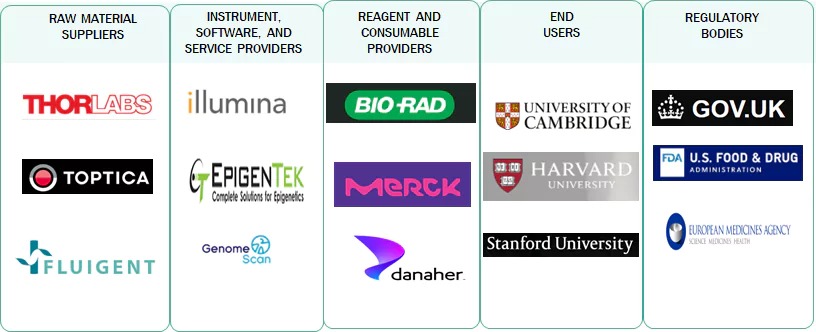The global epigenetics market, valued at US$2.03 billion in 2024, rose to US$2.24 billion in 2025 and is projected to grow at a CAGR of 13.9% from 2025 to 2030, reaching US$4.29 billion by the end of the period. In Germany, the sector is poised for accelerated growth, driven by substantial investments in next-generation sequencing (NGS) technologies that are improving accessibility, reducing costs, and enabling high-throughput epigenetic analysis. These developments are expanding the application of epigenetics in diagnostics, therapeutics, and research.
Download PDF Brochure:https://www.marketsandmarkets.com/pdfdownloadNew.asp?id=896&utm_source=reportsnreports.com&utm_medium=refferal&utm_campaign=kk20
Key market growth factors include reduced sequencing costs, faster turnaround times, expansion of population screening programs, and the increasing adoption of epigenetics-based diagnostics and therapeutics. Germany’s strong biomedical research infrastructure and focus on innovation make it a key European hub for epigenetics adoption.
Technological Advancements in Epigenetics Research
Germany’s epigenetics market is benefiting from rapid advances in technology, particularly in NGS platforms. These systems enable precise mapping of DNA methylation, histone modifications, and chromatin accessibility at genome-wide scales. The integration of single-cell analysis techniques allows researchers to assess epigenetic modifications at unprecedented resolution, critical for understanding heterogeneous diseases like cancer.
German research institutions are also investing in bioinformatics and data analytics platforms to streamline epigenetic data interpretation, leading to faster translation into clinical applications. These advancements are unlocking opportunities in oncology, neurology, and developmental biology, positioning Germany as a leader in innovative, tech-driven epigenetic applications.
Limited Applications of Epigenomic Data in Toxicology
Despite strong growth prospects, the market faces constraints. Epigenomic data in toxicology is still in its early stages, and Germany is no exception. The lack of standardized protocols, high costs of profiling technologies, and absence of regulatory frameworks (particularly from agencies like the FDA, which influence global standards) limit widespread adoption in toxicological testing. Furthermore, the requirement for advanced bioinformatics capabilities and highly trained professionals adds to operational challenges.
Download PDF Brochure:https://www.marketsandmarkets.com/pdfdownloadNew.asp?id=896&utm_source=reportsnreports.com&utm_medium=refferal&utm_campaign=kk20
Emerging Applications Beyond Oncology
Germany’s epigenetics sector is expanding beyond oncology into neurodegenerative disorders, cardiovascular disease, autoimmune conditions, and metabolic syndromes. The ability to identify biomarkers for early diagnosis and disease classification is opening new avenues in personalized medicine. Additionally, the integration of epigenetic data with other omics technologies is deepening understanding of disease pathways, improving drug target discovery, and driving innovation in fields such as reproductive health, environmental studies, and aging research.
Concerns Regarding Antibody Quality
The reliability of research findings in epigenetics heavily depends on antibody quality. Inconsistent sensitivity, batch-to-batch variation, and insufficient validation processes can compromise results. For Germany’s clinical and research laboratories, this means additional time and resources must be dedicated to validating reagents—slowing project timelines and increasing costs. Strengthening supplier quality control and leveraging novel reagent production technologies are critical to overcoming these hurdles.
By Offering — Kits & Reagents Lead
In 2024, the kits & reagents segment accounted for the largest market share globally and holds strong growth potential in Germany. These consumables are essential for applications like bisulfite conversion, ChIP-sequencing, whole-genome amplification, and detection of small non-coding RNAs. Demand in Germany is fueled by a robust academic research base and rising adoption in clinical diagnostics. Companies such as QIAGEN (headquartered in Germany) are well-positioned to capitalize on this demand through innovation and quality improvements.
By Method — DNA Methylation Dominates
The DNA methylation method leads the German market, reflecting global trends. This technique remains the gold standard for studying epigenetic regulation, with applications in both research and clinical diagnostics. Germany’s emphasis on translational research and personalized medicine ensures continued investment in methylation-based tools, particularly those integrated with NGS platforms.
Germany’s epigenetics market stands at the forefront of technological innovation, with NGS investments driving adoption across research, diagnostics, and therapeutic development. While regulatory and technical challenges remain—particularly in toxicology and antibody quality control—the sector’s expansion into new disease areas and integration with other omics fields signal strong future growth. With its well-developed research ecosystem and active participation from leading biotech companies, Germany is positioned to play a pivotal role in shaping the future of the global epigenetics industry.
Download PDF Brochure:https://www.marketsandmarkets.com/pdfdownloadNew.asp?id=896&utm_source=reportsnreports.com&utm_medium=refferal&utm_campaign=kk20

